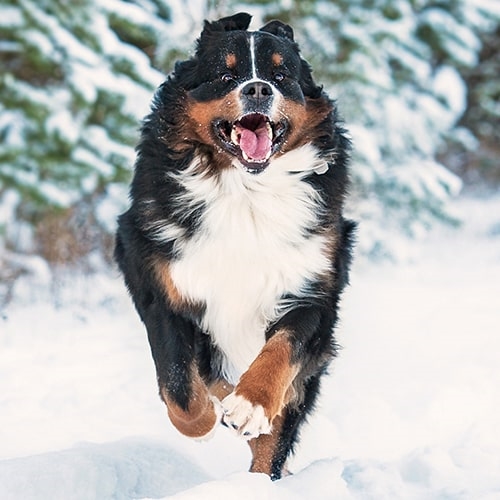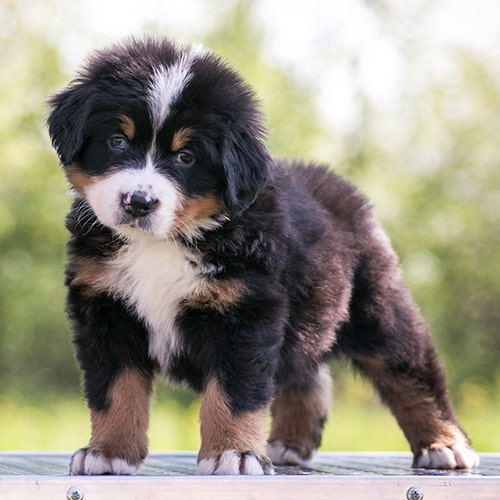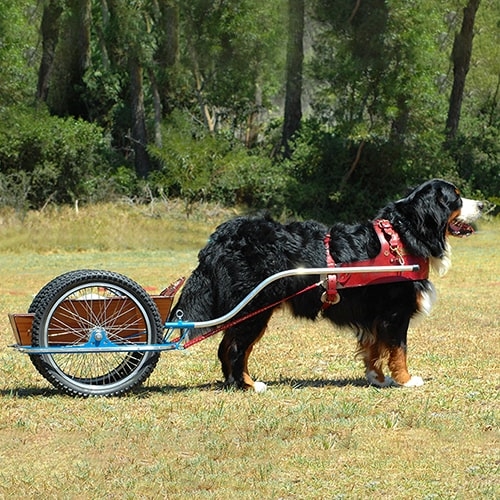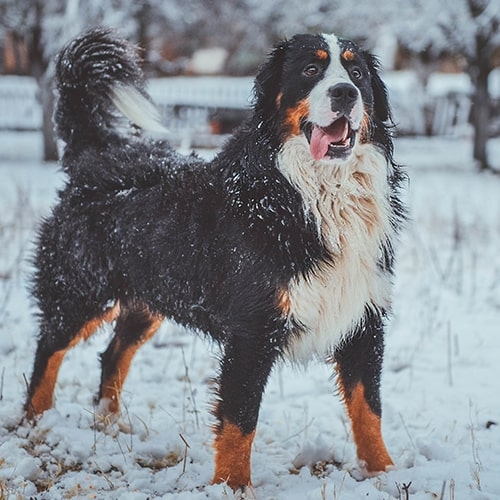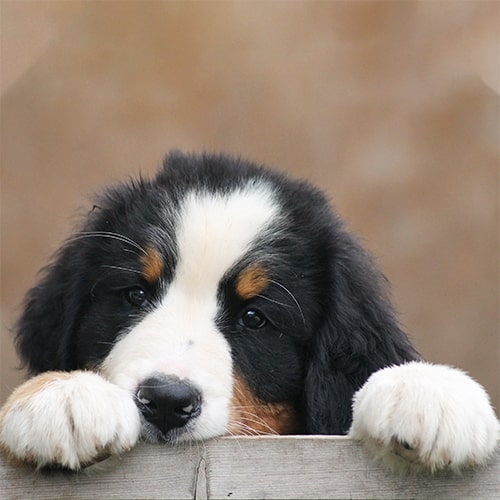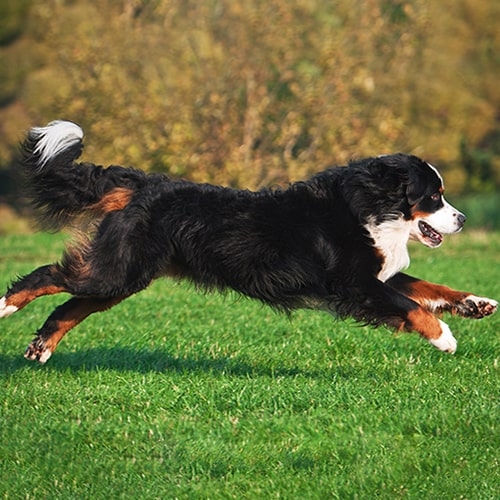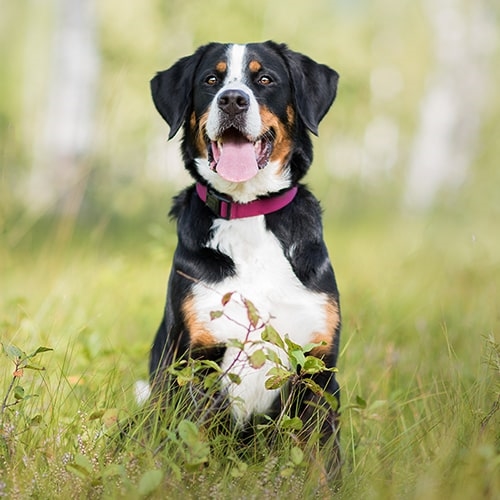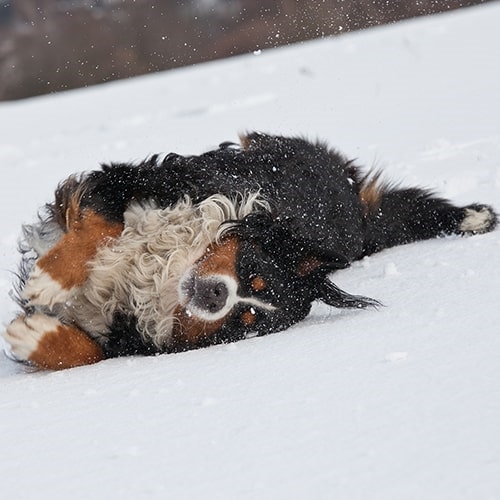| Size | Large |
|---|---|
| Average height | 58-70 cm |
| Average weight | 42-53kg in females and 48-63kg in males |
| Average lifespan | Up to 10 years |
| Minimum exercise (per day) | 1 hour |
| Coat length | Medium |
| Minimum cost (per month) | £105 |
Bernese Mountain Dogs are known for their sweet, gentle personalities and loyalty to their families. This is why they are a popular choice for a lot of families, however due to their size they need to live in a home with plenty of space.
They were originally bred not only as companion dogs but also for work herding cattle, pulling carts and being watchdogs. This means that Bernese Mountain Dogs like to be challenged and active and are very solid, sturdy dogs.
Common health problems in Bernese Mountain Dogs
Bernese Mountain Dogs are friendly and calm dogs who can be great in the right household but unfortunately, like many purebred dogs, they are prone to certain health issues associated with their breed. Fortunately, there are tests and screening for some of the problems Bernese Mountain Dogs can have.
If you’re thinking of buying a Bernese Mountain Dog puppy, we’d recommend getting one from a Kennel Club Assured Breeder, as they meet extra requirements including health screening. Parents having the relevant screening reduces the chances of your puppy being affected by these upsetting conditions. We’d also recommend discussing the medical history of your potential puppy’s parents and grandparents.
Some of the health conditions Bernese Mountain Dogs can develop include:
- Hip dysplasia – where the hip joint doesn’t fit together perfectly, which will eventually lead to arthritis. Before breeding, dogs should be screened by x-rays through the BVA/Kennel Club Hip Dysplasia Scheme.
- Elbow dysplasia – where the elbow joint doesn’t fit together perfectly, which will eventually lead to arthritis. There is BVA/Kennel Club screening for this.
- Gastric Dilatation Volvulus (GDV) – often known as ‘bloat’, where your dog’s stomach can bloat and twist around on itself.
- Degenerative Myelopathy (DM) – a condition of the spine that causes a gradual paralysis of the back end.
- ‘Hot spots’ – patches of sore, infected skin.
- Progressive retinal atrophy – loss of sight, which gets worse over several months or years.
- Cruciate disease – where the cruciate ligament which holds the knee together is damaged and the knee joint becomes wobbly and painful.
- Certain cancers.
If you want to minimise the risk of your dog getting problems due to exaggerated features, you can read our advice on choosing a pedigree dog.
Caring for your Bernese Mountain Dog
Bernese Mountain Dogs are known for being ‘gentle giants’ and can be great pets in the right households, but due to their size and strength they may not be suited to families with younger children and you’ll need to make sure you have a big enough car for taking them to and from the vets!
Being from a working background, Bernese Mountain Dogs need plenty of exercise and love a challenge so they can use their minds. Like all dogs, Bernese Mountain Dogs love company and prefer to have a family member with them all the time. They can be destructive if they get bored, so remember to give them plenty to do to keep them occupied.
Bernese Mountain Dogs and barking
As with any dog, Bernese Mountain Dogs are likely to make noise and it’s down to the individual dog how much they bark or vocalise. As part of their background was as watchdogs, your Bernese Mountain Dog may bark to let you know if someone unfamiliar is coming towards the house or if something is out of the ordinary. They are known for having a deep, loud bark which can put some owners off. If you’re having problems with excessive noise or barking, we recommend seeking the advice of an accredited behaviourist.
Training and socialisation
Bernese Mountain Dogs are very intelligent and eager to please their owners, which makes them easy to train for experienced owners. Positive, reward-based training should start from an early age as Bernese Mountain Dogs are so big and powerful – without proper training they could become boisterous which isn’t ideal given their size! If you aren’t an experienced trainer, or are a first-time dog owner, then you should ask for the help of an accredited trainer.
Remember to socialise your Bernese Mountain Dog as a puppy with lots of other dogs, different people and types of experiences. They are known for being sensitive dogs so need good socialisation to help them grow to be confident dogs.
As with any dog, your Bernese Mountain Dog should never be left alone for more than four hours and even this may be too long. They are a breed known for their attachment to their owners so you may find they suffer from separation anxiety when you’re not around. It’s best to spend as much time with them as you can as this will also help you bond.
Exercise
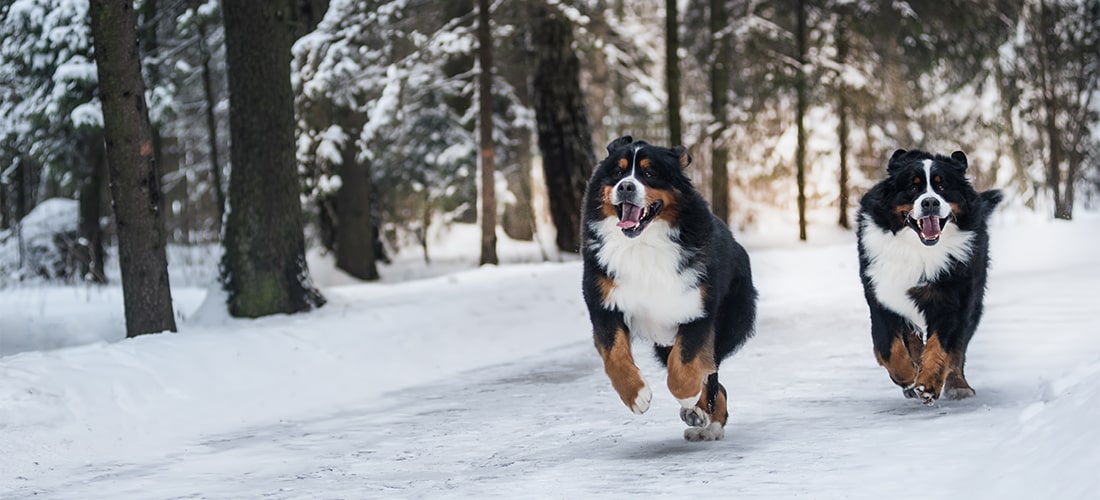
Bernese Mountain Dogs are known for their energetic, puppy-like behaviour right into their senior years so they need a fairly active household. As they were bred to be working dogs, they need to be kept active both physically and mentally. Remember that Bernese Mountain Dogs were bred to work in the cold, snowy mountains so you’ll need to make sure they don’t overheat, especially in warmer weather.
Bernese Mountain Dogs need at least an hour of exercise every day. You can split this into a number of walks with some off-lead time in secure areas. On top of this, your Bernese Mountain Dog will also need plenty of playtime, training and free time in a large, secure garden. When the weather is cold, you may want to take advantage of this and go on some extra-long walks!
Grooming
Bernese Mountain Dogs have incredibly thick coats to keep them warm in the mountains they are native to, so be prepared for a lot of shedding! If you’re fairly house proud, they may not be the best dog for you. Their coats are fairly high maintenance and they’ll need a good brush several times a week to keep on top of the dead hair. You may find you’re grooming them daily in the spring and autumn when they shed the most!
Make sure to invest in a decent comb, brush or shedding tool to keep on top of their grooming and make sure your dog is happy and comfortable. You may also find your Bernese Mountain Dog drools. A lot. Remember to take something to mop them up while you’re out and about!
Bernese Mountain Dogs and children
Although Bernese Mountain Dogs are friendly and patient, due to their size and strength we wouldn’t recommend them for families with smaller children. Although they are known to be very tolerant and enjoy company, they can also be boisterous and may accidentally knock over smaller children or adults with little experience of the breed.
Always supervise children and vulnerable adults with your Bernese Mountain Dog and make sure your dog has somewhere they can go to have child-free relaxation. It’s important that you make sure you can recognise the signs of unhappiness or anxiety in your dog to help avoid any conflicts.
Bernese Mountain Dogs and other pets
A well socialised Bernese Mountain Dog should get along fine with other dogs. They are not known for being aggressive and so given the right socialisation from a young age they’re unlikely to be confrontational towards other dogs.
Due to their size, introductions to unfamiliar pets need to be done very carefully and slowly. While your Bernese Mountain Dog will tolerate other pets if well socialised from a young age we wouldn’t recommend leaving them unsupervised with smaller pets.
Food
Your Bernese Mountain Dogs's diet will vary depending on their age and any health conditions they may have. you'll need to feed them a complete, balanced dog food to keep them slim and healthy.
Your vet will be able to tell you how much your dog should be eating. You should feed a healthy Bernese Mountain Dog a good quality, commercially available and complete dog food and it’s usually recommended to split their daily allowance into two meals. If you give your dog an occasional treat or use treats for training, remember to take this into account and reduce their daily allowance. Treats shouldn’t make up more than 10% of their calories or they can unbalance their diet.
You can try to feed your dog at the same time every day to get them into a routine. Remember to leave a gap after eating and before exercising, as this is thought to reduce the risks of GDV (bloat).
The cost of owning a Bernese Mountain Dog
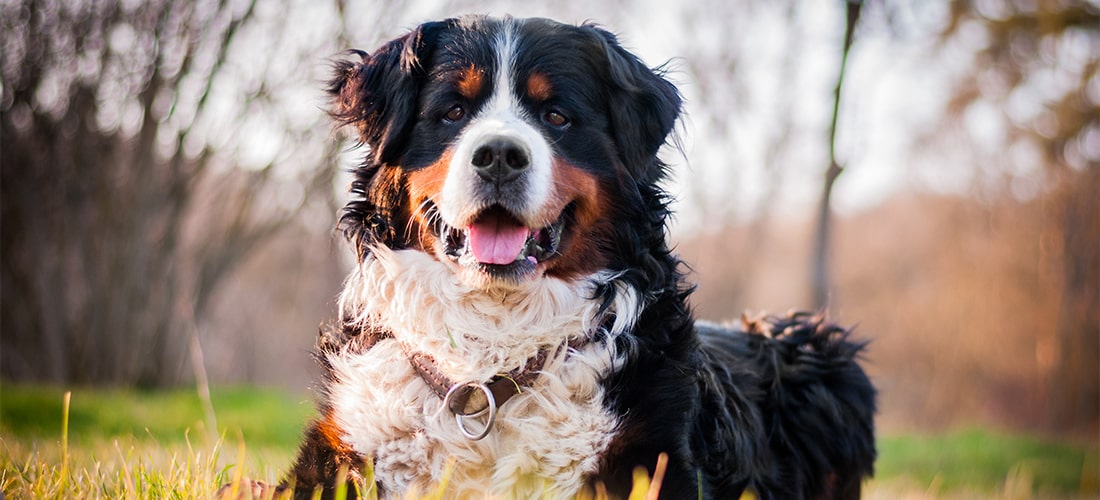
Having a Bernese Mountain Dog will cost a minimum of £105 per month after purchase and set-up costs and up to £17,000 across their lifetime. However due to their size, your Bernese Mountain Dog may well cost a lot more!
Costs you’ll need to think about include:
Purchase costs
Adopting an adult dog from a rescue centre may be a more cost-effective option, as well as having the added advantage of offering a home to a pet without one – check if the rehoming centre you’re looking at asks for a donation for rehoming.
If instead you’re buying a Bernese Mountain Dog puppy from a breeder, you’ll need to factor in this cost. Beware unusually cheap puppies as they could come from a puppy farm. If you want to buy a pedigree puppy, we recommend looking for a Kennel Club Assured breeder as they have to do extra health tests and meet high standards.
Set-up costs
- Puppy vaccines – if you rescue a dog, reputable centres will often vaccinate them for you. Remember that ongoing booster vaccinations will be needed to continue their immunity.
- Neutering – you should usually arrange for your dog to be neutered at around 6 months old, though your vet will be able to advise you exactly when is best. Check prices at your local practice as these will depend on your vet and where you live. Some rescue centres will neuter any dogs they rehome, saving you this cost.
- Equipment – including a collar and tags, lead, harness, dog beds, dog bowls, pet-safe toothpaste and toothbrushes, grooming brushes and toys. Keep in mind that all these will need to be replaced with wear or damage or if your dog outgrows or damages them!
Ongoing costs
- Food.
- Preventive healthcare – budget for routine vet visits to help stop your dog getting ill and catch any problems early. They need annual check-ups, vaccinations and regular flea and worming treatments. Check if your vet offers a health care plan as this can help spread the cost throughout the year.
- Vet bills* or pet insurance – if you don’t have pet insurance and your dog needs veterinary treatment for an injury or illness, costs can rapidly mount up. Check what’s covered and what isn’t when comparing policies.
- Accessories – including lots of poo bags, replacing worn toys and grooming accessories, buying doggy toothpaste and any other extras they might need.
Other costs
- Training – basic training is very important and dogs can benefit from formal classes. Some dogs may have, or develop, behavioural problems which might need professional management.
- Boarding – you may also need to budget for boarding or dog sitting costs if you are planning to go away from home on holiday.
- Dog walkers/day-care – you might consider a professional dog walker to keep your dog happy and healthy if you’re unable to get out with your dog enough yourself, or to look after them during the day if you need to be out for more than four hours.
* It’s always better to plan ahead and budget or get pet insurance in case your pet gets injured or unwell. If you are having difficulty with veterinary costs, you can check if you are eligible for treatment at PDSA here.
If you’re considering pet insurance, our PDSA Pet Insurance could be a great option for you and it’s quick and easy to get a quote online.
Fun facts
- In the 1800s, Bernese Mountain Dogs were used as delivery dogs to pull carts full of cheese in the Swiss Alps.
- Bernese Mountain Dogs are known for being a little... immature. They mature slower than other dogs and can often keep their puppy-like energy throughout their lives.
- They're known for their big doggy smiles! Bernese Mountains Dogs often look like they are smiling at their owners.
- Bernese Mountain Dogs are very versatile – they were bred to work on farms and were used for herding, as guard dogs and pulling carts using their immense strength.
Getting a Bernese Mountain Dog
Do plenty of research before you think about getting a Bernese Mountain Dog. You’ll need a lot of patience training them out of their puppy-like ways, but in return you’ll get a fantastically loyal and sweet-natured dog. They’re incredibly powerful and can haul up to 10 times their own weight, so need plenty to keep them active and burn off excess energy.
Rehoming centres
There are plenty of rescue centres across the country where you may find a Bernese Mountain Dog. Breed-specific rescues that specialise in Bernese Mountain Dogs are out there too. You'll need to ask any rescue centre about the dog's history to make sure they will be comfortable in your home. Good rescue centres should let you know of any health and behaviour problems.
Breeders
If you buy a Bernese Mountain Dog puppy from a breeder, make sure your puppy will be well socialised and have all necessary health checks and vaccinations. We recommend looking for a Kennel Club Assured breeder as they meet higher standards. We’ve put together some advice to help you find a good breeder.

